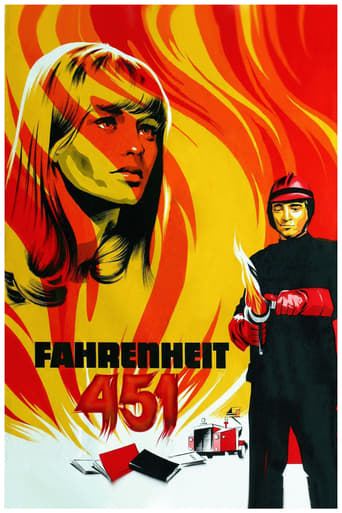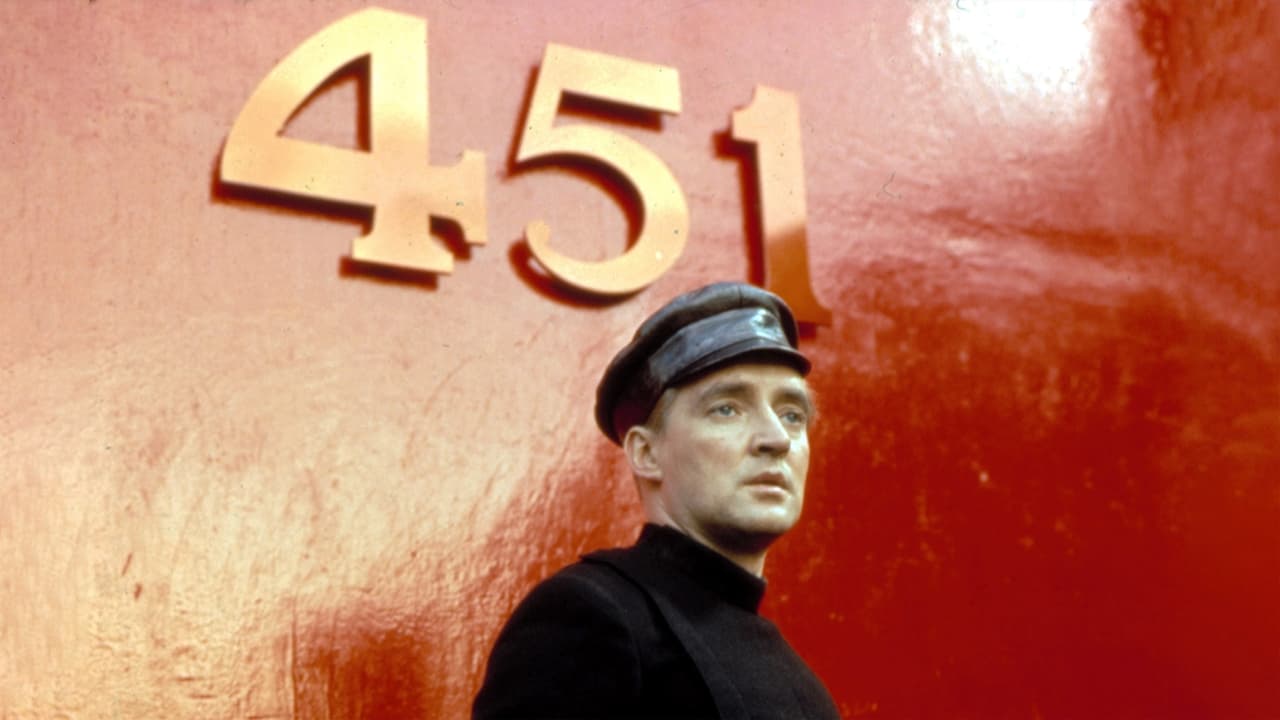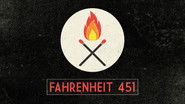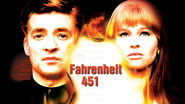grantss
Good, but not great. I haven't read the book but central plot is great. The anti-censorship, pro-freedom-of-expression, anti-fascism, message is a powerful one. However, the story is told in mostly dull and listless fashion. Quite boring to start off with and takes a while to get going. Even once it becomes interesting, it still isn't enthralling. Performances are so-so. Julie Christie is good but the remaining cast are average, at best.Best to read the book, I think.
Dalbert Pringle
First off - What I'd like to know is this - Why-oh-why are so many SyFy stories that forecast man's future always so annoyingly bleak and the outlook so lousy? Eh? Why? Like - Are we really that doomed even before we get there?When it comes to this particular sterile and dry vision of man's future where the reading of books is banned by law - It made no sense to me why people were still being taught to read and write. I mean - What the hell for?Also - I found it hard to believe that what took place in this 1966 movie's storyline was how the law handled the ones who were outed for having books. Like - C'mon! Seriously!!??And, finally - Speaking about French director, Francois Truffaut's screen adaptation of Ray Bradbury's 1953 novel - IMO - "Fahrenheit 451" played out like a super-cheesy "Made-For-TV" movie. It really did.This film's drab plotline was as dry as dust. It was intellectually insulting. It was painfully predictable. And, overall, as a production, it came across like something you'd expect from the likes of shlock director, Ed Wood. I ain't kidding.
James Hitchcock
Most dictatorships have forbidden the publication, or even the possession, of books which they consider repugnant to their particular world view and some- most notoriously Nazi Germany- have organised public burnings of banned literature. The dictatorship described in "Fahrenheit 451", however, has taken matters one stage further. The government have not merely banned books which offer support to their political opponents or to alternative ideologies. They have banned all books, without exception. In our society firemen put out fires- in this society they start them, as the government employs the fire brigade to seek out and burn those illegal books which a few criminal elements still persist in concealing.Ray Bradbury's novel has many similarities with two other dystopian stories, George Orwell's "1984" and Aldous Huxley's "Brave New World". The relationships between the characters are particularly reminiscent of those in Orwell's book. Guy Montag, the Fireman who begins reading the very books which it is his duty to burn, equates to Orwell's Winston Smith, another minor functionary who comes to hate the regime he serves. Montag's friend Clarisse, who shares his dissident views and love of literature, is the equivalent of Winston's girlfriend Julia. And the Captain is, like O'Brien in "1984" or Mustapha Mond in "Brave New World", the "raisonneur", the defender of the system who tries to persuade the dissident of the wrongness of his views. Bradbury also introduces a fourth major character with no equivalent in "1984", Montag's wife, called Mildred in the original novel and Linda in the film.The arguments put forward by the Captain are those which all book-lovers will have all heard many times from book-haters- novels are pointless because they deal with imaginary people who never existed, philosophy is pointless because philosophers frequently disagree with one another, books make people unhappy or discontented with their lot, people who are well-read tend to look down on those who are not, blah, blah, blah
. In the real world, however, such opinions are merely Philistine and crass. In the world of "Fahrenheit 451" they have become the official doctrine of a Fascist state and its justification for persecuting its opponents, by which it means not only those who want to overthrow the regime but also those who refuse to conform to accepted social conventions.Bradbury's book was set in his native America, but the film switches the action to Britain, even though it had a French director, François Truffaut. (This was his only English-language film, and also his first colour film). The action is supposed to take place at some unspecified future date, but Truffaut makes little attempt to give it a futuristic look. The architecture, clothes and interior design are all very much those of the late sixties. The only futuristic elements are the monorail- one of those oft-made predictions for the future which in most parts of the world has stubbornly refused to come true- and the large wall-mounted colour television sets, a surprisingly accurate prediction. From the viewpoint of 2017 they look very modern, but in 1966 British television was still in black-and-white and people only had small, free-standing sets.When I first saw this film a number of years ago, I did not care much for the casting of Oskar Werner as Montag or for the double-casting of Julie Christie as both Clarisse and Linda. Having recently seen the film again I am inclined to change my mind about these matters. (Truffaut certainly came to regret using Werner- the two had a massive falling-out while working on this movie, despite having previously worked together on "Jules et Jim"). Certainly, Werner's English is not good, and he speaks with a heavy Germanic accent, but then Montag does have a German surname, something much less common in Britain than it would be in America, where a large number of people are of German descent. The casting of an Austrian actor in the role, after his original choice Terence Stamp dropped out, may have been a deliberate move on Truffaut's part to suggest that Montag is an outsider in this society and does not wholly share its values. It is notable that in the film he is never referred to as "Guy", the very Anglo-Saxon Christian name he has in the novel; even Linda just calls him "Montag".Christie was originally cast only as Linda, and it was intended that Jean Seberg should play Clarisse. Truffaut, however, changed his mind and decided to cast the same actress as both women, who are never on screen together. (Christie wears different hairstyles in each role, and the short, boyish cut she wears for Clarisse makes her look rather like Seberg, who favoured closely cropped styles). HIs idea, I think, was to imply that the two women are not polar opposites but two sides of the same coin. We sense that both are highly intelligent, but Linda is too lazy, or too frightened, to make full use of her intelligence, and whereas Clarisse is prepared to question the regime and its values, Linda takes refuge in conformism and an unthinking acceptance of the status quo.The other very effective feature of this film is the strangely poetic ending- not the same as the one in Bradbury's novel- in which Montag and the "book people" are seen wandering through a snowy landscape. The look of this scene was entirely fortuitous- it was shot in April, but an unseasonable cold spell meant that the ground was covered in snow. This detail adds a certain bleakness to Truffaut's chilling vision of the future; had the scene been shot in cheery April sunshine that might have made the ending a bit too optimistic. 8/10
JoeKulik
Never read Bradbury's novel & don't intend to do so, so this review is strictly based upon my viewing of the film Fahrenheit 451.This film is SO-O-O-O BAD that I had to stop watching 1/2 way through, so my review is based only on the 1st 1/2 of the film.I only watched this film because I decided to find out what the French "New Wave" cinema was all about & I'm in the process of watching all of Truffaut's directorial efforts starting with his 1st film, 400 Blows. This film is Truffaut's 5th effort as sole director of a feature film & it is such a disappointing departure from his previous films. The "New Wave" was supposed to be a cinematic rebellion against the staged, stiff, & formulaic French films of the 1940's & 1950's. Truffaut did a pretty good job at rebelling in his 1st 4 films but this one is little more than a formulaic canned Hollywood style sci-fi film. None of the creativity & freshness so evident in his previous efforts is evident here. In short, in Fahrenheit 451, Truffaut sells out to the Cinematic Establishment that he railed against as a film critic in the 1950's & that he rebelled against in his 1st 4 productions.The cinematography in this film is just poor compared to Truffaut's earlier films. No long shots. No shots of the mundane, trivial details that were so interesting in earlier films. No extended shots of faces. The shooting of this entire film includes a large, very dark halo around the entire screen with only a small bright opening in the center of the screen. What's That About? This is obviously a very LOW LOW budget film because for a futuristic sci-fi movie the props were VERY VERY low tech. Montag's boss had conventional, made for paper file cabinets in his office. The phones all had rotary dials, even though digital push button phones were available in 1966. The telephone handsets were right out out of the 1920's. The fire trucks were not only low tech, but their construction was just crude & amateurish. The work suits of the firemen were likewise crude & their headgear looked like those worn by WWI fighter pilots. The appliances in Montag's house were all 1960's vintage, except for the large TV screen on the wall. The houses & apartments were not futuristic at all. The monorail was the only prop that was remotely futuristic looking. The hat that Montag wore off duty looked like a German worker's hat from the 1930's. This film did the POOREST job I've ever scene of creating a futuristic world in a film that is supposed to be about a futuristic society.The casting was horrible. Seems like every actor had a different foreign accent. Casting Julie Christie in 2 separate roles in the same film is just a hare brained idea that didn't work. The only other time that I've ever seen the same actor cast in 2 different roles in the same film was an Italian movie where the same actor played both identical twin brothers & that was an appropriate use of an actor in twin roles in the same film. I saw Oskar Werner in Truffaut's Jim And Jules, & he was great in that film because he was cast appropriately. In this film, Werner was just lousy as Montag & gave the character no depth whatsoever.The whole idea of the futuristic society in this film spending so much time & effort at burning books is just STUPID. Montag tells his boss that he's been a fireman (book burner) for 6 years & there is a scene where new recruits are being trained to be firemen & Montag's boss is telling him about expanding operations by hiring even more firemen & there are scenes of firemen looking for books EVERYWHERE (including a baby carriage). My Question Is - Where The Hell Are All These Books Coming From?? With all the man power & technology that has been apparently been put into burning all the books over the number of years envisaged in this film, surely all the books would've been destroyed long before this film even started. Presumably, the printing presses have already all been shut down, so the remaining task would only entail burning all the books that existed before the printing presses stopped producing new books. But the extended, ongoing effort portrayed in this film to destroy books seems to assume that number of already existing books out there is never ending, which is just ridiculous & contrary to common sense. After you stop the printing presses, the destruction of all the remaining books in a society would be a very short term proposition, if done intensively & not entail the never ending effort envisaged in this phony movie. If you really wanted to eradicate all the books in a society, then you'd simply do a door to door search of every house & building & Voila !!, it's just done & over with.I will continue plowing through Truffaut's directorial efforts but after Fahrenheit 451 I'm just not expecting things to get better. Like other directors (such as John Sayles) who started their careers determined to make "different" & "better" films, it looks like Truffaut sold out his artistic & creative values for the Almighty Buck & that's just a shame.


 AD
AD







